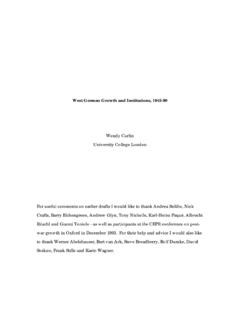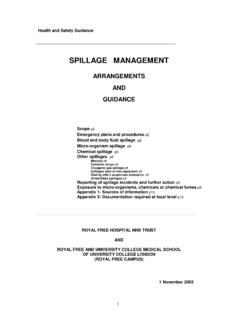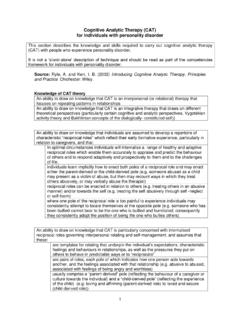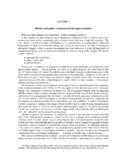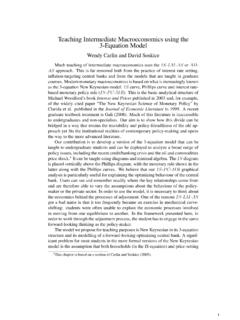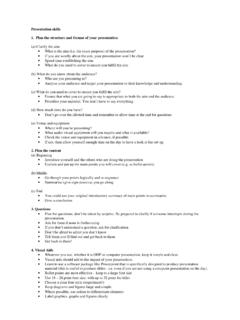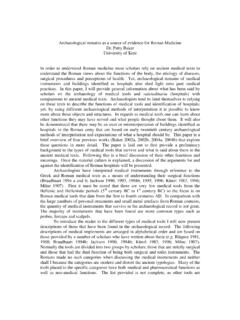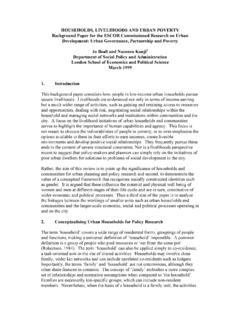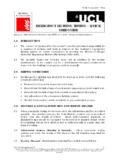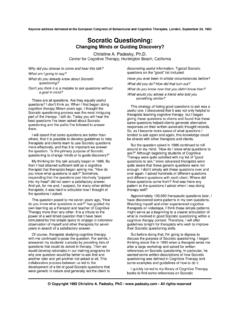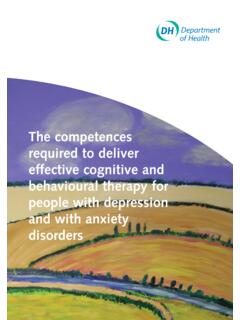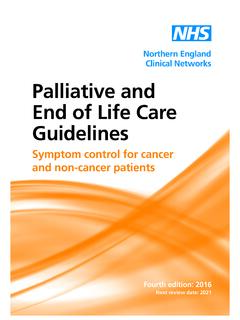Transcription of IAPT PERINATAL COMPETENCY FRAMEWORK
1 IAPT PERINATAL COMPETENCY FRAMEWORKSEPTEMBER 2021 Professor Heather O MahenDr Sarah HealyTABLE OF CONTENTSA BRIEF DESCRIPTION OF THE COMPETENCES FRAMEWORK FOR 3 PSYCHOLOGICAL APPROACHES AND INTERVENTIONS IN THE PERINATAL PERIODACKNOWLEDGEMENTS 4A COMPETENCE FRAMEWORK FOR IAPT PSYCHOLOGICAL APPROACHES 5 AND INTERVENTIONS IN THE PERINATAL PERIOD EXECUTIVE SUMMARY 5 HOW TO USE THIS DOCUMENT 6 SCOPE OF THE COMPETENCE FRAMEWORK 9 THE DEVELOPMENT OF THE COMPETENCE FRAMEWORK 10 THE COMPETENCE MODEL FOR PERINATAL PSYCHOLOGICAL INTERVENTIONS IN IAPT SETTINGS 12 IMPLEMENTING THE COMPETENCE FRAMEWORK 13 APPLYING THE COMPETENCE FRAMEWORK 14 CONCLUDING COMMENTS 16 DOMAIN ONE: CORE PROFESSIONAL COMPETENCES 18 DOMAIN TWO: CORE KNOWLEDGE AND CLINICAL COMPETENCES 19 DOMAIN THREE: GENERIC THERAPEUTIC COMPETENCES 22 DOMAIN FOUR: ASSESSMENT, FORMULATION, ENGAGEMENT AND PLANNING 23 DOMAIN FIVE: INTERVENTION SKILLS 28 DOMAIN SIX: METACOMPETENCES 34 REFERENCES 36 FIGURESFIGURE 1: THE MAP OF PERINATAL COMPETENCES 172 IAPT PERINATAL COMPETENCY FRAMEWORK Welcome to the COMPETENCY FRAMEWORK for delivering psychological therapies in the PERINATAL period in IAPT services.
2 A BRIEF DESCRIPTION OF THE COMPETENCES FRAMEWORK FOR PSYCHOLOGICAL APPROACHES AND INTERVENTIONS IN THE PERINATAL PERIOD The FRAMEWORK describes the various activities which need to be brought together in order to carry out clinical work in the context of PERINATAL work within IAPT. The FRAMEWORK locates competences across six domains , each of which represents a broad area of practice. This helps users to see how the various activities associated with work in this area fit together. The COMPETENCY FRAMEWORK includes only perinatally specific competences, existing COMPETENCY frameworks should be used to inform general its primary audience will be clinicians, clinical managers and commissioners of primary care mental health services (particularly IAPT), service users will also find the COMPETENCY FRAMEWORK useful. 3 IAPT PERINATAL COMPETENCY FRAMEWORK ACKNOWLEDGEMENTS The work described in this report was commissioned by NHS England (NHSE).
3 The project team was headed by Prof Heather O Mahen and Dr Sarah REFERENCE GROUP (ERG) The work was overseen by an Expert Reference Group whose invaluable advice, editorial comments and collegial approach contributed enormously to the development of the ERG COMPRISED:Tessa Baradon Consultant Infant Mental Health PsychotherapistProfessor Jane Barlow Chair of Evidence-Based Social Intervention and Policy Evaluation, Oxford UniversityCath Beard Expert by ExperienceAsha Day Vice Chair Community Practitioners & Health Visitors Association Equality & PERINATAL Lead Clare Dolman Vice Chair, Maternal Mental Health AllianceRob Ewers Operations Director, Acacia Family Support Beth Fisher IAPT service managerDr Rachel Handley Director of Adult HI Programmes, University of ExeterNicola Haycock IAPT High Intensity TherapistJemima Headey Administrator and motherBecky Hopley Psychological Wellbeing PractitionerProfessor Louise Howard Professor of Women s Mental Health & Consultant PERINATAL PsychiatristDr James Gray Consultant Clinical Psychologist & Clinical Lead iCope IslingtonDr Catherine Green Principal Clinical Psychologist, Community PERINATAL ServicesRuth Jackson CEO.
4 Bluebell CareSophia Kosmider Psychological Wellbeing PractitionerJo Maitland London PERINATAL Mental Health Clinical Lead Clare McAdam Deputy Director of Nursing and Allied ProfessionsDr Kirstie McKenzie-McHarg Consultant PERINATAL Clinical PsychologistDr Rachel Mycroft Consultant Clinical PsychologistDr Annabelle Norman IAPT Deputy ManagerTamara Parsons Senior Psychological Wellbeing PractitionerNicki Pattinson Clinical Midwifery Matron for Outpatient ServicesDr Clair Pollard IAPT Clinical LeadDr Camilla Rosan Consultant Clinical PsychologistProfessor Pauline Slade Professor of Clinical Psychology/ Consultant Clinical PsychologistJennifer Smith Expert by ExperienceDr Sarah Taha PERINATAL PsychiatristTHE COMPETENCY WRITING TEAM: This was headed by Dr Sarah Healy and Prof Heather O Mahen, with contributions from:Dr Fiona Challacombe Clinical Psychologist Jo Maitland London PERINATAL Mental Health Clinical Lead Dr Rachel Mycroft Consultant Clinical PsychologistDr Emma Svanberg Clinical PsychologistDr Charlotte Whitely Counselling PsychologistPEER REVIEWERS:We are very grateful to the following reviewers for their comments:Dr Kate Daley Clinical PsychologistProf Tony Roth Professor of Clinical PsychologyDr Kyla Vaillancourt PERINATAL Clinical PsychologistWORKING GROUP.
5 Prof David Clark National Clinical and Informatics Advisor for IAPTS arah Dunsdon Programme Manager, National PERINATAL Mental Health Team, NHS England Lucy Ellis PERINATAL Mental Health Programme Lead, NHS EnglandBecky Gill Project Manager, Improving Access to Psychological therapies (IAPT)Jemma Kehoe National Programme Lead for IAPTDr Sheena Liness Cognitive Therapy Director, Kings College LondonMary Pappin Project Manager, National PERINATAL Mental Health Team, NHS EnglandDr Adrian Whittington IAPT National Clinical Advisor: Education, NHS England4 IAPT PERINATAL COMPETENCY FRAMEWORK A COMPETENCE FRAMEWORK FOR IAPT PSYCHOLOGICAL APPROACHES AND INTERVENTIONS IN THE PERINATAL PERIODEXECUTIVE SUMMARYThe report describes a method for identifying competences for all IAPT staff working with clients in the PERINATAL period.
6 It organises the competences into domains are: Core underpinning competences for working in the PERINATAL period Core knowledge of the PERINATAL period and PERINATAL mental health Generic therapeutic competences required for managing clinical sessions and any form of psychological intervention in the PERINATAL period Competences in relation to assessment, formulation and engagement Intervention skills MetacompetencesThe report then describes and comments on the type of competences found in each domain and organises these into a map which shows how all the competences fit together and inter-relate. Finally it addresses issues that are relevant to the implementation of the competence FRAMEWORK and considers some of the organisational issues around its report assumes that core and generic therapeutic competences establish the structure for both low- and high-intensity interventions and form the context and structure for the implementation of specific evidence-based therapies .
7 For example, Psychological Wellbeing Practitioners (PWPs) and High Intensity (HI) therapists will both need to consider how having a baby affects a parent s cognitions, behavioural repertoire, and interpersonal relationships. We have specified where competences may be unique to high-intensity. These are primarily where there are specific skills and approaches that pertain to work with approaches ( couple therapy) or disorders ( post-traumatic stress disorder) undertaken by high-intensity therapists only. 5 IAPT PERINATAL COMPETENCY FRAMEWORK HOW TO USE THIS DOCUMENT This report describes the model underpinning the competence FRAMEWORK , and indicates the various areas of activity that, taken together, represent good psychological clinical practice. It describes how the FRAMEWORK was developed and how it may be used. The FRAMEWORK is available from the UCL Competence FRAMEWORK Site.
8 ( ).Please note that this PERINATAL IAPT COMPETENCY FRAMEWORK draws on the PERINATAL COMPETENCY FRAMEWORK developed by Health Education England (HEE) for all staff working to support parents and families across the PERINATAL care pathway. This IAPT-specific PERINATAL FRAMEWORK complements the HEE PERINATAL multidisciplinary competence FRAMEWORK . It draws from the HEE PERINATAL competences that are relevant for low intensity (PWP) and high intensity practitioners, with further detail for competences related to specific evidence-based PERINATAL interventions offered within IAPT ( ). The document recognises that some foundational competences may be relevant for a range of health professionals working with individuals during the PERINATAL period. This FRAMEWORK only references those competences in terms of the work that IAPT clinicians would undertake (even if other professionals should also have them).
9 This document has been compiled with reference to other IAPT competences (Roth & Pilling, 2007) and should be used in conjunction with them, in particular the Cognitive and behavioural Therapy FRAMEWORK . There is an expectation that core therapeutic competences will be met through core PWP/High Intensity therapy training. This document focuses on additional competences, specific to the PERINATAL period and should be used in conjunction with the HEE PERINATAL competence FRAMEWORK , particularly the PERINATAL assessment and therapy competences. Problems that can be effectively and appropriately treated within IAPT:The chart below specifies evidence for treatments used in IAPT, by condition. Column 4 shows NICE (2014) Antenatal and Postnatal Guideline (CG192) recommended treatments, with references to PERINATAL -specific evidence-based treatments.
10 Column 5 shows how to make PERINATAL adaptations to existing evidence-based SEE TABLE ON FOLLOWING PAGE 6 IAPT PERINATAL COMPETENCY FRAMEWORK ConditionaIAPT recommended treatmentsSourcePerinatal-Specific TreatmentPerinatal AdaptationsSTEP 2: Low Intensity InterventionsDepressionIndividual guided self-help based on CBT, computerised CBT, behavioural activation, structured group physical activity programme NICE guidelines: CG90, CG91, CG123 Loughnan et al. 2019 Milgrom et al. 2016 Milgrom et al. 2011aMilgrom et al. 2005 (effective group intervention)O Mahen et al. 2013O Mahen et al. 2014 Trevillion et al. 2020 See note aGeneralised Anxiety DisorderSelf-help, or guided self-help, based on CBT, psycho-educational groups, computerised CBT NICE guidelines: CG113, CG123 Loughnan et al. 2019 Loughnan et al. 2018 Panic DisorderSelf-help, or guided self-help, based on CBT, psycho-educational groups, computerised CBTNICE guidelines: CG113, CG123 Arch Dimidjian, & Chessick, 2012 adaptations for exposureObsessive-Compulsive DisorderGuided self-help based on CBTNICE guidelines: CG31, CG123 Challacombe et al.
